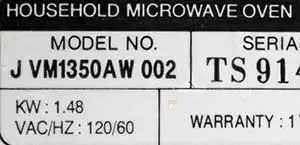Copyright 2025 Electrical101.com All Rights Reserved.



Appliances with high power consumption can use up most of the capacity of a 15 or 20 amp circuit. They could cause an overload when combined with other appliances and trip the circuit breaker.
If two hair dryers are used at the same time on the same circuit, the circuit breaker will trip. Outlets in two different bathrooms can be on the same circuit. Distributing high power appliances to a separate circuit, or not using them at the same time may help prevent tripping a circuit breaker.
High Wattage Appliance Examples
- Hair dryer
- Electric space heater
- Window air conditioner
- Garbage compactor
- Countertop microwave
- Electric tea kettle
- Toaster / toaster oven
- Coffee maker
Maximum Watts on Circuits
Circuits should never exceed or carry their full load capacity except for very short times. Instead, they should be derated by a minimum of 20%. This prevents circuit breakers and wires from overheating.
The Derated Circuit Capacity Table shows the derated capacity of 20 and 15 amp circuits. Total appliance load should not exceed this derated capacity on a circuit.
Derated Circuit Capacity Table

Kitchen Appliance Wattage Ratings
Kitchen appliances should be arranged not to exceed the derated capacity of a circuit. Appliances have labels that show information including rated load in watts, amps, or volt-
Add the wattage rating of each appliance on the same circuit, try not to exceed 1920 W on a 20 A circuit and 1440 watts on a 15 A circuit (ignore appliances on a dedicated circuit).
Toaster Label

Built-
1480 Watts on a dedicated circuit

Countertop Oven Label
Not Enough Circuits for all Appliances
Sometimes the total wattage of appliances is higher than total circuit capacity, especially in smaller or older homes. In this case, arrange appliances that won’t normally be used at the same time on the same circuit. The countertop oven above right should not be on the same circuit as any other high wattage appliance unless they will not be used at the same time.
Dedicated Circuits
A dedicated circuit has only one outlet and is used for a load that has a high current rating. The list below shows common appliances that are usually (or should be) on a dedicated circuit. For more information see our dedicated circuits page.
- Electric range and oven
- Window air conditioner 1200 watts or more
- Wall mounted microwave
- Electric dryer